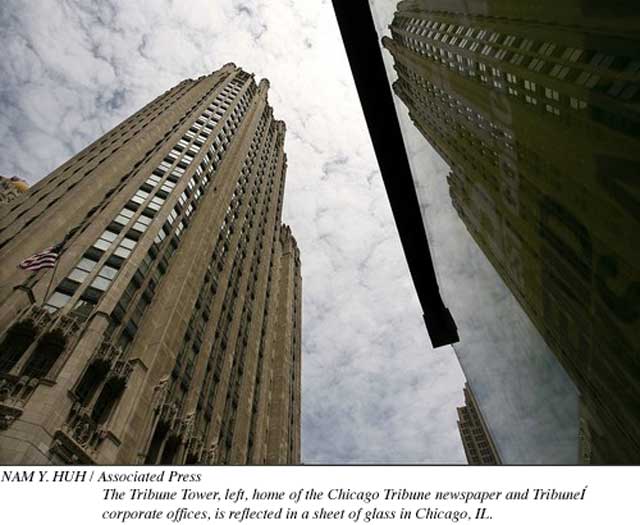
Tribune Co. files for Chapter 11 bankruptcy protection

The Chicago company, which owns the L.A. Times and KTLA Channel 5, will stop making interest payments on $12 billion in debt as it attempts to restructure its loans, chairman Sam Zell says.
By James Rainey and Michael A. Hiltzik
December 9, 2008
Tribune Co., the owner of the Los Angeles Times, KTLA Channel 5 and dozens of other daily newspapers and television stations across the country, filed Monday for bankruptcy protection from creditors, in the latest indication of deteriorating economics for the news business.The company's ills, which stem principally from declining advertising revenues, have been exacerbated by the heavy debt load of $12 billion it incurred a year ago when it was taken private by Chicago real estate entrepreneur Sam Zell.
But they parallel troubles afflicting many other newspaper and broadcasting companies nationwide: In recent weeks, the McClatchy newspaper chain put its Miami Herald up for sale, the Christian Science Monitor said it would abandon daily print publication in favor of Web operation, the Philadelphia Inquirer and Minneapolis Star-Tribune have flirted with or entered default, and the New York Times said it would mortgage its headquarters skyscraper in midtown Manhattan to help cover operating costs.
But none as yet has gone so far as to file for bankruptcy, which could add a new dimension of uncertainty for Tribune and its 16,000 employees. During a bankruptcy reorganization, major management decisions are subject to the approval of a bankruptcy judge, and the ultimate fate of a company -- including whether it remains intact or is sold off in pieces -- could be decided in part by its creditors.
Zell said Monday that Tribune's business units would continue operating as normal and that the focus of the bankruptcy reorganization would be "on our debt, not on our operations." In its filing in bankruptcy court in Delaware, the company said it had $7.6 billion in assets and debts of nearly $13 billion.
In talks with executives and staff members at Tribune business units, Zell and other corporate officials said the company as a whole remains cash-flow positive before debt service is taken into account. Its largest units, including The Times, are profitable on the same basis.
"The focus of the filing today is 100% on relieving the pressure on the company from its debt," Zell said in the interview with reporters from Tribune newspapers. "By virtue of the filing today we will suspend making interest payments, which should give us added flexibility in order to continue moving forward."
Indeed, the company has been considering the possible purchase of the Orange County Register and the San Diego Union-Tribune in an effort to consolidate the Southern California market for print and online advertising.
Zell did not address any acquisition talks with Register owner Freedom Communications or Copley Newspapers, which owns the Union-Tribune. In response to a question about those possible purchases, he said that deals with a strong strategic rationale would probably win assent from the bankruptcy judge.
Tribune directors approved the action to seek protection under Chapter 11 of the bankruptcy code in a meeting Monday, just as a $70-million payment on an outstanding medium-term loan was coming due.
Although the Chicago company had roughly $300 million cash on hand, more than enough to make the installment payment, executives had been trying to achieve a broad restructuring of its debt in conjunction with the payment.
Those efforts failed in part because economic conditions have made projecting the future course of the company's revenue and earnings exceptionally difficult: Not only are projections of the length and depth of the recession hard to come by, but the continuing credit crunch has injected uncertainty into even routine business transactions.
"One of the most difficult things we have to deal with is that nobody has much visibility into 2009," Zell said in a conference call with Tribune journalists. "Obviously we would not want to complete the reorganization until we felt pretty secure that we understood what the future ongoing visibility was."
He did say in a statement to employees, however, that "a precipitous decline in revenue and a tough economy have coupled with a credit crisis, making it extremely difficult to support our debt. All of our major advertising categories have been dramatically impacted."
Tribune reported last month that its operating revenues for the third quarter ended Sept. 30 decreased 10%, to $1 billion, as advertising revenues fell 19% compared with a year earlier.
Tribune's debt service costs, most of them incurred as a result of the going-private transaction a year ago, have been running at the rate of about $1 billion a year. A $512-million principal payment related to the buyout is due in June.
Money for that payment was to come from asset sales, particularly the sale of the Chicago Cubs baseball franchise. That sale, originally expected to take place this year, has been delayed in part because of the credit crisis and is now expected to take place in 2009.
Some analysts have projected the value of the Cubs, its landmark Wrigley Field ballpark and other associated real estate at more than $1 billion.
Zell, the chairman and CEO of Tribune, said in his statement that the baseball franchise would not be part of the bankruptcy filing. He said in a conference call with Tribune reporters that he expected a deal for the baseball club to be completed soon.
Rainey and Hiltzik are Times staff writers.
james.rainey@latimes.com
michael.hiltzik@latimes.com